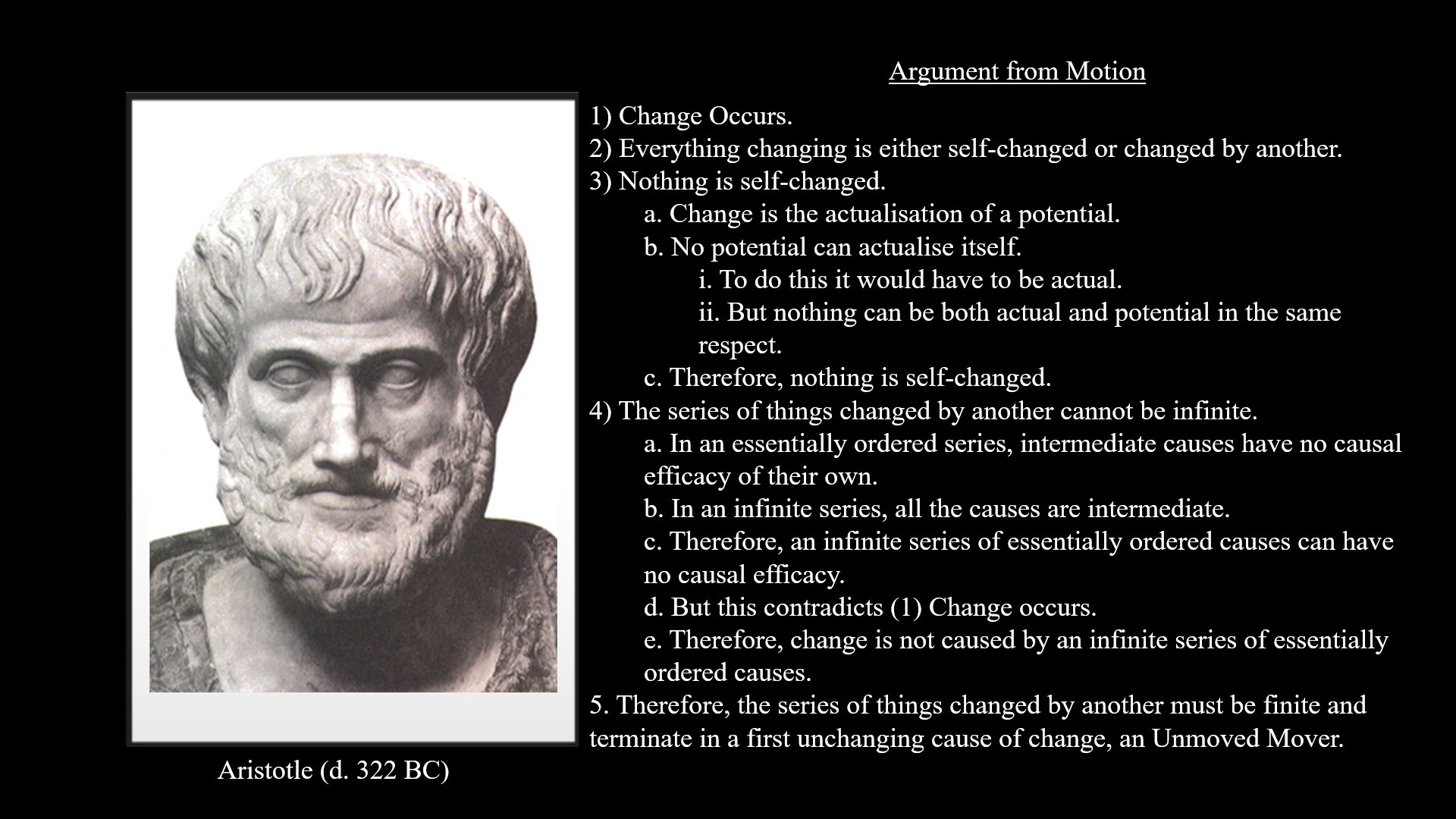wishIwasSalludon
broken but not destroyed
- Joined
- Nov 9, 2023
- Posts
- 30,445
- Reputation
- 52,904
I was familiar with the contingency argument but never excepted its conclusion because I didnt see why the universe couldnt just be eternal, or say there be some sort of big bang, big crunch cycle.
This argument however is different, I have been engaging with classical philosophy more while I heard of it I never payed much attention to it. I got iq mogged by this Greek manlet called Aristotle who lived
I recently took to reading more about the Greeks and came across Aristotle's argument from motion. I've been contemplating it for over a month and cant come up with a reasonable objection.
As far as I can tell the moment you accept the first premise its over. But no one reasonable denies the first premise obviously change occurs.

I came up with 3 objections all of which failed under scrutiny. I always came to the conclusion that Aristotle is most likely correct.
1.
Immediately after reading the argument my initial objection was positing that a potential actualizes itself. I felt embarrassed having thought this because if you just think about it for more than a second you realize this is a retarded objection. For a potential to actualize itself it would have to be actual which is the very thing we are questioning.
2.
The second and maybe the most intuitive example is to posit that there is an infinite number of actualities which then actualize other potentialities. This avoids the problem of a potential actualizing itself in the same respect. Each actualization of a potential is being actualized by an actuality in a different respect so it avoids the problem.
Aristotle addresses this in his argument but lets just say that hes wrong for the sake of argument. Its not just enough to posit something we need to think about whether its likely. We could posit the idea that that the universe was created by a dalit farting after eating expired curry. This would sufficiently explain the universe and yet no one would accept it for obvious reasons.
We need to ask the same question here, is this likely to be true? The answer is no because of occams razor. We arent just multiplying entities beyond necessity we are multiplying them infinitely. That is why I rejected this possibility even if we reject Aristotle's objection to it.
3.
a)
At this point I was getting desperate so then what if we just deny the PSR? After thinking I found this problematic for several reasons. First off if we deny the PSR a whole new scenario is possible. Our perceptual states causing us to believing anything could be occurring for no reason at all so you cant even give a reason for the PSR being false. So it would seem that to deny the PSR you would also have to accept the PSR.
b)
The second reason is even if the PSR is false it would seem that violations of the PSR are incredibly unlikely. There is no example you can given which strictly violates the PSR. At best you can give an example of the strong PSR being violated but even that is suspect as there are deterministic interpretations of QM. So violations of the PSR seem to be unlikely so all we have done by denying the PSR is go from "there is a 100% chance of actus purus" to "there is a 99% chance of actus purus". Its not exactly a robust objection. It suffers the exact same problem as objection 2.
c) There's also the problem of the burden of proof. As induction points heavily to the PSR being true so that places the burden of proof on the deniers of the PSR to show why the PSR is not true. But then the problem in objection A rears its head again. If the PSR is false you have no reason to trust your perceptual states, thus you cannot give a good reason for the PSR being false. As Alexander Pruss said "there is no demon deceiving you, instead your perceptual states are occurring for no reason at all".
So now we have to accept that Aristotle's pure act most likely exist. But who says this pure act is intelligent? Sure it exists but if its not even conscious you cant really call it "God". But thinking about it more Occam's razor would suggest this pure act has intent as if it didnt it would have had to create a VERY large amount of universes for us to be here.
So it would seem that this being has 3 properties at least. It is immaterial, intelligent and it is actus purus(pure act) it has no potentiality it is unchanging.
@imontheloose @SlayerJonas @Mainlander
This argument however is different, I have been engaging with classical philosophy more while I heard of it I never payed much attention to it. I got iq mogged by this Greek manlet called Aristotle who lived
I recently took to reading more about the Greeks and came across Aristotle's argument from motion. I've been contemplating it for over a month and cant come up with a reasonable objection.
As far as I can tell the moment you accept the first premise its over. But no one reasonable denies the first premise obviously change occurs.

I came up with 3 objections all of which failed under scrutiny. I always came to the conclusion that Aristotle is most likely correct.
1.
Immediately after reading the argument my initial objection was positing that a potential actualizes itself. I felt embarrassed having thought this because if you just think about it for more than a second you realize this is a retarded objection. For a potential to actualize itself it would have to be actual which is the very thing we are questioning.
2.
The second and maybe the most intuitive example is to posit that there is an infinite number of actualities which then actualize other potentialities. This avoids the problem of a potential actualizing itself in the same respect. Each actualization of a potential is being actualized by an actuality in a different respect so it avoids the problem.
Aristotle addresses this in his argument but lets just say that hes wrong for the sake of argument. Its not just enough to posit something we need to think about whether its likely. We could posit the idea that that the universe was created by a dalit farting after eating expired curry. This would sufficiently explain the universe and yet no one would accept it for obvious reasons.
We need to ask the same question here, is this likely to be true? The answer is no because of occams razor. We arent just multiplying entities beyond necessity we are multiplying them infinitely. That is why I rejected this possibility even if we reject Aristotle's objection to it.
3.
a)
At this point I was getting desperate so then what if we just deny the PSR? After thinking I found this problematic for several reasons. First off if we deny the PSR a whole new scenario is possible. Our perceptual states causing us to believing anything could be occurring for no reason at all so you cant even give a reason for the PSR being false. So it would seem that to deny the PSR you would also have to accept the PSR.
b)
The second reason is even if the PSR is false it would seem that violations of the PSR are incredibly unlikely. There is no example you can given which strictly violates the PSR. At best you can give an example of the strong PSR being violated but even that is suspect as there are deterministic interpretations of QM. So violations of the PSR seem to be unlikely so all we have done by denying the PSR is go from "there is a 100% chance of actus purus" to "there is a 99% chance of actus purus". Its not exactly a robust objection. It suffers the exact same problem as objection 2.
c) There's also the problem of the burden of proof. As induction points heavily to the PSR being true so that places the burden of proof on the deniers of the PSR to show why the PSR is not true. But then the problem in objection A rears its head again. If the PSR is false you have no reason to trust your perceptual states, thus you cannot give a good reason for the PSR being false. As Alexander Pruss said "there is no demon deceiving you, instead your perceptual states are occurring for no reason at all".
So now we have to accept that Aristotle's pure act most likely exist. But who says this pure act is intelligent? Sure it exists but if its not even conscious you cant really call it "God". But thinking about it more Occam's razor would suggest this pure act has intent as if it didnt it would have had to create a VERY large amount of universes for us to be here.
So it would seem that this being has 3 properties at least. It is immaterial, intelligent and it is actus purus(pure act) it has no potentiality it is unchanging.
@imontheloose @SlayerJonas @Mainlander



